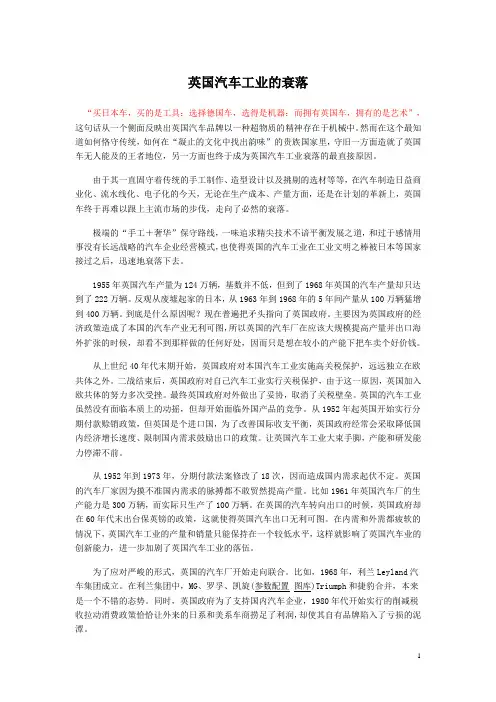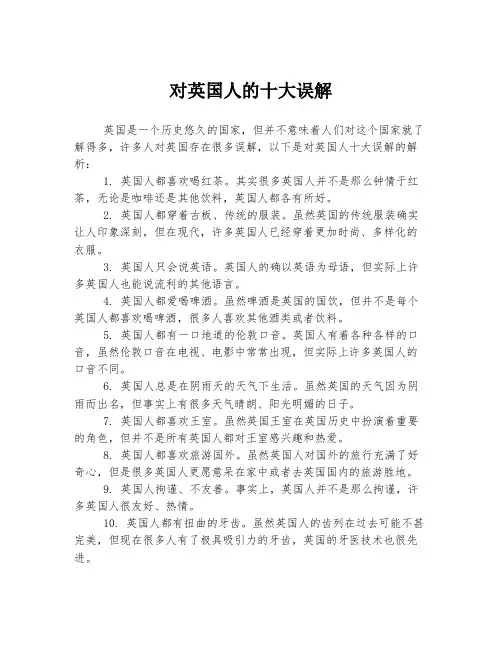为何英国人不爱搞晶圆厂?
- 格式:docx
- 大小:20.05 KB
- 文档页数:4

晶圆代工行业发展特点
晶圆代工行业是半导体产业链中的重要环节,其发展特点包括以下几个方面:
1. 技术密集型:晶圆代工涉及到微纳加工工艺、制程控制、设备维护等高度技术密集的环节,需要大量的专业技术和工程师团队支持。
2. 资金密集型:晶圆代工需要大规模的设备投资、工厂建设等高额资本投入,同时还需要保持持续的研发投入,以跟进新一代半导体工艺的发展。
3. 规模经济效应明显:规模是晶圆代工企业获取竞争优势的关键因素之一,大型代工企业能够通过规模效应降低成本、提高产能和质量水平,从而吸引更多客户合作。
4. 高度市场竞争:晶圆代工行业竞争激烈,市场份额高度集中在少数几家大型企业手中,行业内竞争主要体现在技术创新能力、生产效率、产品质量等方面。
5. 需求的快速变化:随着半导体市场需求的快速变化,特别是移动互联网、物联网、人工智能等新兴领域的快速崛起,晶圆代工企业需要快速调整生产能力和技术水平,以满足市场需求。
6. 产业链协同发展:晶圆代工企业与芯片设计企业、封装测试企业等产业链上下游企业密切合作,形成良好的协同效应,以提高整个产业的竞争力。
总之,晶圆代工行业在技术、资金、市场等方面存在独特的发展特点,需要企业具备强大的技术研发能力、规模经济效应和市场敏感度,才能在激烈的市场竞争中立足并取得长期发展。

英国汽车工业的衰落“买日本车,买的是工具;选择德国车,选得是机器;而拥有英国车,拥有的是艺术”,这句话从一个侧面反映出英国汽车品牌以一种超物质的精神存在于机械中。
然而在这个最知道如何恪守传统,如何在“凝止的文化中找出韵味”的贵族国家里,守旧一方面造就了英国车无人能及的王者地位,另一方面也终于成为英国汽车工业衰落的最直接原因。
由于其一直固守着传统的手工制作、造型设计以及挑剔的选材等等,在汽车制造日益商业化、流水线化、电子化的今天,无论在生产成本、产量方面,还是在计划的革新上,英国车终于再难以跟上主流市场的步伐,走向了必然的衰落。
极端的“手工+奢华”保守路线,一味追求精尖技术不谙平衡发展之道,和过于感情用事没有长远战略的汽车企业经营模式,也使得英国的汽车工业在工业文明之棒被日本等国家接过之后,迅速地衰落下去。
1955年英国汽车产量为124万辆,基数并不低,但到了1968年英国的汽车产量却只达到了222万辆。
反观从废墟起家的日本,从1963年到1968年的5年间产量从100万辆猛增到400万辆。
到底是什么原因呢?现在普遍把矛头指向了英国政府。
主要因为英国政府的经济政策造成了本国的汽车产业无利可图,所以英国的汽车厂在应该大规模提高产量并出口海外扩张的时候,却看不到那样做的任何好处,因而只是想在较小的产能下把车卖个好价钱。
从上世纪40年代末期开始,英国政府对本国汽车工业实施高关税保护,远远独立在欧共体之外。
二战结束后,英国政府对自己汽车工业实行关税保护,由于这一原因,英国加入欧共体的努力多次受挫。
最终英国政府对外做出了妥协,取消了关税壁垒。
英国的汽车工业虽然没有面临本质上的动摇,但却开始面临外国产品的竞争。
从1952年起英国开始实行分期付款赊销政策,但英国是个进口国,为了改善国际收支平衡,英国政府经常会采取降低国内经济增长速度、限制国内需求鼓励出口的政策。
让英国汽车工业大束手脚,产能和研发能力停滞不前。
从1952年到1973年,分期付款法案修改了18次,因而造成国内需求起伏不定。

英特尔放弃对外晶圆代工业务,不见得有利台积电转
单
日前,市场传出为了能填补14 纳米制程的产能缺口,处理器龙头英特尔(intel)在进行旗下 3 座位于包括美国俄勒冈州、爱尔兰以及以色列的晶圆厂产能扩产之外,还将关闭对外定制化晶圆代工业务。
有相关人士看好此举,在英特尔退出晶圆代工市场的情况下,有机会对龙头台积电造成转单效应。
不过,目前市场分析师表示,原本英特尔晶圆代工市占比例本来就不高,所以转单效应其实有限。
根据外媒的报导,过去一段时间以来,英特尔对无晶圆厂的IC 设计公司开放定制化的晶圆代工服务是个错误决定。
因为这不但影响了英特尔在处理器方面的核心竞争力,还因为程序上的错误,导致近期14 纳米产能不足,使得个人电脑产业蒙受处理器缺少所带来冲击的结果。
因此,英特尔为了填补14 纳米制程的产能空缺,决定关闭对外晶圆代工业务,专心将珍贵的产能用于自身的产品量产上。
而在此计划传出之后,有人看好在英特尔退出晶圆代工市场之后,将有机会为台积电带来转单效益。
对此,市场分析师表示,全球主要IC 设计厂商在保护自家技术的考量下,下单给英特尔代工的本来就不多。

晶圆sbir定义
晶圆SBIR(Small Business Innovation Research)是指在半导体制造领域,针对晶圆生产过程中的创新研发项目的一种资助计划。
SBIR是美国国会的一项政策,旨在促进小型企业创新研究和发展,从而提高国家科技实力和经济竞争力。
晶圆SBIR项目主要关注以下方面:
1. 新型晶圆生产技术:包括薄膜制备、光刻、刻蚀、掺杂等工艺的创新和方法;
2. 晶圆厂设备研发:如清洗设备、刻蚀机、氧化炉、炉膛等设备的创新和改进;
3. 晶圆生产材料:如硅单晶圆、硅化合物、掺杂剂等材料的研发和优化;
4. 生产过程控制与优化:包括生产自动化、在线监测、过程控制、生产调度等领域的创新;
5. 环保与能源节约:针对晶圆生产过程中的废水、废气等污染治理以及节能技术的研发;
6. 半导体器件设计与制造:包括新型器件结构、制造工艺、封装测试等方面的创新。
通过晶圆SBIR项目,美国国会向小型企业提供资金支持,鼓励他们在半导体制造领域进行创新研究,进而推动整个行业的发展。
这对于我国半导体产业的发展也具有重要的参考意义。

英国破产的原因是什么英国,曾经的“日不落帝国”,在世界历史的舞台上扮演过极其重要的角色。
然而,近年来,关于英国面临经济困境甚至破产的讨论不绝于耳。
那么,导致这种情况出现的原因究竟是什么呢?首先,英国经济结构的不合理是一个重要因素。
长期以来,英国经济过度依赖金融服务业。
伦敦作为全球重要的金融中心,金融行业在英国经济中占据了极大的比重。
然而,这种过度依赖单一产业的经济结构存在着巨大的风险。
一旦金融市场出现波动,如金融危机,英国经济就会受到严重冲击。
相比之下,制造业等实体经济在英国经济中的比重逐渐下降,这使得英国在面对外部经济环境变化时,缺乏足够的韧性和稳定性。
其次,脱欧是导致英国经济陷入困境的一个关键事件。
脱欧给英国带来了一系列的经济难题。
贸易方面,英国与欧盟之间的贸易壁垒增加,导致贸易成本上升,贸易规模受到限制。
许多原本在英国设立总部或生产基地的企业,为了继续享受欧盟单一市场的便利,纷纷将业务转移到其他欧盟国家。
这不仅导致了投资的外流,还造成了大量的就业岗位流失。
此外,脱欧还引发了英镑汇率的波动,增加了经济的不确定性。
再者,英国的公共债务问题日益严重。
为了应对经济危机、疫情等各种挑战,英国政府不断增加财政支出,导致公共债务规模持续扩大。
高额的债务负担使得政府在财政政策上的操作空间受限,难以有效地进行大规模的投资和刺激经济增长。
同时,为了偿还债务,政府不得不削减公共服务开支,这进一步影响了社会的稳定和民生的改善。
科技发展的相对滞后也是英国面临的一个挑战。
在全球科技竞争日益激烈的今天,英国在一些关键领域的科技创新能力不足。
相比美国、中国等科技强国,英国在信息技术、人工智能、生物技术等新兴领域的投入和发展相对较慢。
这使得英国在全球产业分工中的地位逐渐下降,难以依靠科技创新来推动经济的持续增长。
劳动力市场的问题也不容忽视。
一方面,英国的劳动力素质参差不齐,高端人才相对短缺,而低技能劳动力过剩。
这导致了人力资源的配置不合理,影响了企业的生产效率和创新能力。

对英国人的十大误解
英国是一个历史悠久的国家,但并不意味着人们对这个国家就了解得多,许多人对英国存在很多误解,以下是对英国人十大误解的解析:
1. 英国人都喜欢喝红茶。
其实很多英国人并不是那么钟情于红茶,无论是咖啡还是其他饮料,英国人都各有所好。
2. 英国人都穿着古板、传统的服装。
虽然英国的传统服装确实让人印象深刻,但在现代,许多英国人已经穿着更加时尚、多样化的衣服。
3. 英国人只会说英语。
英国人的确以英语为母语,但实际上许多英国人也能说流利的其他语言。
4. 英国人都爱喝啤酒。
虽然啤酒是英国的国饮,但并不是每个英国人都喜欢喝啤酒,很多人喜欢其他酒类或者饮料。
5. 英国人都有一口地道的伦敦口音。
英国人有着各种各样的口音,虽然伦敦口音在电视、电影中常常出现,但实际上许多英国人的口音不同。
6. 英国人总是在阴雨天的天气下生活。
虽然英国的天气因为阴雨而出名,但事实上有很多天气晴朗、阳光明媚的日子。
7. 英国人都喜欢王室。
虽然英国王室在英国历史中扮演着重要的角色,但并不是所有英国人都对王室感兴趣和热爱。
8. 英国人都喜欢旅游国外。
虽然英国人对国外的旅行充满了好奇心,但是很多英国人更愿意呆在家中或者去英国国内的旅游胜地。
9. 英国人拘谨、不友善。
事实上,英国人并不是那么拘谨,许多英国人很友好、热情。
10. 英国人都有扭曲的牙齿。
虽然英国人的齿列在过去可能不甚完美,但现在很多人有了极具吸引力的牙齿,英国的牙医技术也很先进。

美国为什么不制造芯片
美国是世界上最大的经济体,但它在芯片制造方面却处于落后地位。
芯片是电子设备的基础,它们可以控制电子设备的功能,并且可以改变电子设备的性能。
芯片制造技术是一项复杂的技术,需要大量的投资和技术支持。
美国在芯片制造方面的落后,主要是由于投资不足和技术支持不足。
美国政府一直把重点放在军事和空间技术上,而忽视了芯片制造技术的发展。
此外,美国的科技公司也没有投入大量资金来支持芯片制造技术的发展。
另外,美国的芯片制造技术也比其他国家落后。
美国的芯片制造技术比中国、日本和韩国等国家落后很多,这是由于美国技术研究和开发的投资不足,以及美国技术研究和开发的技术水平落后。
此外,美国的芯片制造技术也受到了全球竞争的影响。
由于全球竞争的激烈,美国的芯片制造技术比其他国家落后很多,这使得美国的芯片制造技术无法与其他国家竞争。
总之,美国在芯片制造方面的落后,主要是由于投资不足、技术支持不足、技术水平落后以及全球竞争的影响。
美国政府和科技公司应该加大对芯片制造技术的投资,提高技术水平,以提高美国在芯片制造方面的竞争力。

英国为什么不承认是日耳曼人一、英国有关官方拒绝承认是日耳曼人的原因1. 第一类:英国的政治策略并不依赖于识别特定的民族。
由于英国的政策面向的是在国家范围内的所有公民,而不是某个民族,因此针对日耳曼等民族提出什么要求和利益冲突问题,英国政府往往不会参与其中。
2. 第二类:历史起源方面问题。
英格兰和苏格兰本身也是一个杂合民族,由于具有很多具有不同语言、不同宗教信仰和不同民族成分所混合而成,因此英国政府可能不愿意承认它本身具有日耳曼民族的属性,因为这可能会建立在重要的多元性的基础上,而这会影响到英国国家的团结性。
3. 第三类:文化偏见方面的原因。
在历史的长河中,英国人对于日耳曼族的看法一直充满了误解与偏见,尤其是英格兰的低俗文化造成的恶意煽动,使得许多人对于日耳曼民族的态度变得更加抵制,这其中就包括了英国政府,因此他们不愿意承认自己具有日耳曼血统。
二、英国能从中获得什么好处1. 第一,英国强调普世价值观,因此不会受日耳曼民族所限制。
他们认为西方民主及其遵循的法律制度没有任何族群偏见,不会因为民族而差别对待,公民在受到宗教、外貌、政局信仰及其他民族的自由活动上不受到限制和束缚,而日耳曼民族的发展也应体现出这种普世价值观。
2. 第二,英国政府拒绝承认日耳曼民族,也意味着未来该民族在政治方面不会把英国作为主要目标,也不会提出任何特殊要求或要求特殊待遇,从而维护英国政府的宗教自由和其他尊重的信仰的权利,而且英国不用承认该民族也不会面临针对于日耳曼民族的极端和极端权限要求的压力或挑战。
3. 第三,英国可以通过承认日耳曼民族来进一步构建英国和欧洲大陆的互信关系。
与英国本身具有许多杂乱不一的民族成分不同,日耳曼民族呈现出团结一致的特点,英国可以利用这个优势来构建地缘政治上的良好关系,加强英国与欧洲大陆的互信。

英国禁止机器出口令一、英国禁止机器出口的背景近年来,我国制造业的快速崛起引起了全球关注。
作为全球制造业的领导者和技术创新的前沿国家,英国为了保护本国产业和市场,出台了一项禁止机器出口的政策。
这一政策旨在限制高端技术装备的外流,维护英国在全球产业链中的地位。
然而,这一政策也对全球产业链产生了一定的影响,尤其是对我国制造业的发展带来了不小的压力。
二、禁止机器出口对英国的影响1.经济影响英国禁止机器出口在一定程度上保护了本国企业,避免了低端产业的外流。
然而,这一政策也使得英国企业错过了海外市场的巨大机遇,限制了经济增长。
2.产业升级与转型禁止机器出口促使英国加大科技创新力度,推动产业转型升级。
英国政府鼓励企业研发高端技术,提升产品附加值,以适应全球市场的需求。
3.技术创新与发展在这一政策背景下,英国企业加大了研发投入,推动了技术创新与发展。
这使得英国在全球产业链中的地位更加稳固,为未来发展奠定了基础。
三、我国应对策略与启示1.加强自主研发与创新面对英国的禁止机器出口政策,我国企业应加大自主研发和创新力度,提高产品技术含量,提升竞争力。
同时,政府应加大对科技创新的扶持力度,为企业提供政策支持和资金补助。
2.推动产业转型升级我国制造业应抓住这一机遇,加快产业转型升级,培育新兴产业,提高产业链整体竞争力。
此外,还需加强人才培养,提高人才素质,以适应产业发展需求。
3.拓展国际市场在我国制造业转型升级的过程中,企业应积极开拓国际市场,寻求新的发展空间。
政府也应积极参与国际竞争,争取更多的国际市场份额。
四、全球竞争格局下的机遇与挑战在全球竞争格局下,我国制造业面临着巨大的机遇和挑战。
英国禁止机器出口政策为我国制造业提供了发展契机,但也要求我们不断提高自身竞争力。
在全球产业链的调整中,我国制造业不仅要抓住机遇,还需应对挑战,实现可持续发展。
五、总结与展望英国禁止机器出口政策对全球产业链产生了深远影响。
面对这一政策,我国制造业应积极应对,加大科技创新力度,推动产业转型升级,拓展国际市场。

2024年晶圆市场环境分析一、引言晶圆市场作为半导体行业的重要组成部分,对全球科技发展起着关键作用。
本文将对晶圆市场的环境进行全面分析,包括市场规模、市场竞争、技术发展等方面。
二、晶圆市场规模分析晶圆市场是半导体行业最为重要的市场之一。
从全球范围来看,晶圆市场规模不断扩大。
根据统计数据显示,2019年全球晶圆市场规模达到XX亿美元,预计到2025年将增长至XX亿美元。
晶圆市场的扩大得益于半导体行业的快速发展以及相关技术的不断创新。
三、晶圆市场竞争分析晶圆市场的竞争激烈,主要由少数几家大型公司垄断。
其中,台积电、三星电子和英特尔是全球晶圆市场的主要参与者,占据了市场的大部分份额。
这些大型公司拥有先进的制造技术和规模经济效应,使其在市场竞争中具备明显优势。
此外,市场还存在一些中小型企业,它们通过专注于特定领域的创新产品和服务来获取竞争优势。
四、晶圆市场技术发展分析晶圆市场的技术发展日新月异。
一方面,制造工艺的进步使得晶圆的加工精度更高,能够生产更小尺寸的芯片,满足新一代电子产品对体积和性能的要求。
另一方面,新材料的应用及先进的封装技术也推动了晶圆市场的发展。
例如,高级封装技术可以提高芯片的散热性能,增加存储容量等。
此外,智能制造、人工智能等新兴技术的兴起也给晶圆市场带来新的发展机遇。
五、晶圆市场未来趋势预测晶圆市场的未来发展趋势是多元化和边缘化。
多元化表现在晶圆市场将进一步扩大应用领域,不仅局限于传统的电子产品领域,还将涉及到汽车、工业控制、智能家居等领域。
边缘化则是指市场竞争会加剧,一些中小型企业可能会被淘汰出局,市场份额将更加集中在少数几家大型公司手中。
此外,环保和可持续发展也将成为晶圆市场的重要发展方向。
六、结论晶圆市场作为半导体行业的核心市场,具有巨大的发展潜力。
随着技术的不断创新和市场需求的不断扩大,晶圆市场将保持高速增长。
然而,市场竞争的加剧也需要企业保持创新和竞争优势。
对于投资者和企业来说,了解晶圆市场的环境变化和未来趋势,对于制定战略和做出决策具有重要意义。

半导体出海建厂原因
半导体企业选择出海建厂的原因主要有以下几点:
1. 寻求稀缺资源:为了获取更好的原材料和市场资源,一些企业选择在国外建厂,以便更接近供应链和市场,降低运输和采购成本。
2. 降低成本:在某些国家和地区,劳动力、土地等成本相对较低,这有助于降低生产成本,提高盈利能力。
3. 拓展市场:通过在目标市场国家建厂,企业可以更好地了解当地市场需求和趋势,为当地客户提供更优质的产品和服务。
4. 政策优惠:一些国家为了吸引外国投资和技术转移,会提供税收优惠、土地租赁优惠等政策支持,这也是一些企业选择出海建厂的重要原因。
5. 技术合作:通过在国外建厂,企业可以与当地的技术团队、高校和研究机构等进行合作,共同研发新技术和产品,提升企业的技术实力。
总之,半导体企业选择出海建厂的原因是多方面的,包括寻求稀缺资源、降低成本、拓展市场、政策优惠和技术合作等。
这些因素共同推动了半导体企业在全球范围内的布局和发展。
晶圆的常见缺陷有哪些原因晶圆是电子集成电路制造的基础材料,对其质量要求非常高。
晶圆上常见的缺陷包括以下几个方面的原因:1. 原始材料缺陷:晶圆制备之前,需要从硅锭中切割,而硅锭本身可能存在内部结构缺陷、晶界缺陷或含杂质等问题。
这些缺陷可能会在晶圆加工过程中扩大或传播,导致最终晶圆质量下降。
2. 切割缺陷:制备晶圆时,需要将硅锭切割成薄片形成圆片。
切割过程中可能会引入划痕、残留颗粒或裂纹等缺陷。
这些缺陷会影响晶圆的平整度和表面质量。
3. 绝缘体附着:在制备半导体器件时,通常需要在晶圆上形成电绝缘层,如二氧化硅层。
然而,由于制备过程中的沉积不均匀或杂质污染等原因,可能会导致绝缘层附着不良,形成绝缘体附着缺陷。
4. 掺杂不均匀:为了实现电子器件的功能,需要在晶圆中掺杂特定类型的杂质,如硼、磷等,以改变材料的导电性质。
然而,实际掺杂过程中可能存在掺杂不均匀的问题,造成晶圆区域间电性能差异较大。
5. 晶圆加工缺陷:在晶圆加工过程中,通常会进行多道工序,如光刻、腐蚀、沉积、刻蚀等。
每个工序都有可能引入缺陷,如光刻层残留、腐蚀不均匀、刻蚀深度不一致等。
这些加工缺陷会直接影响晶圆的器件性能和可靠性。
6. 包装缺陷:在晶圆加工完成后,通常还需要进行封装,将芯片连接到封装基底并封装起来。
在封装过程中,可能会出现焊接不良、外观缺陷或封装材料相关的问题,如介质层开裂、封装气泡等。
7. 运输和存储缺陷:晶圆在制备完成后需要进行运输和存储。
不正确的运输和存储条件可能会导致晶圆受到机械损伤、污染等问题,引入缺陷。
总之,晶圆上常见的缺陷来源于各个制备过程中的各种因素,包括初始材料、加工工序以及后续封装、运输和存储过程中的不当操作或环境条件等。
确保晶圆质量的关键在于完善的制备工艺控制和严格的质量管理体系。
Why the British got out of fabs Peter Clarke In response to a request from a participant in the forum discussion below When the smart money got into/out of manufacturing I have tried to answer the questions: "Why the British had to get out of fabs and end up just with design/IP a la ARM ?" and "Why fabs still survive (if not exactly thrive) in the UK's traditional rival France?"
The detailed reasons are complex, generalizations are usually faulty but I will have a go at putting down my perspective as an observer of the electronics industry from the U.K. since 1984.
A primary reason that fabs failed to thrive in the U.K. is that while the Second World War helped create the U.S. as a global economic superpower it more or less bankrupted the U.K. with implications that were heavy in the 1950s and early 1960s and that continue to this day. A second reason is a long-established arts and humanities versus science division in U.K. society.
I think it is still the case that science and technology are not sufficiently well represented amongst the political and wealthy establishment in the U.K. But maybe that is just the science graduate in me talking.
In the distant past the owners and managers of UK companies usually had a non-scientific background. The likes of ARM, Wolfson, CSR, Vodafone and several others are now glorious but relatively recent exceptions.
Back in 1960s U.K. technology-based company management treated engineers as willing serfs who did not need and should not be given too much money. It was a "make do and mend" mentality left over from the Second World War, and many electronics companies continued to be closely aligned to military interests and defense was the early application for electronics.
These companies often could not comprehend or cope with: 1) international competition 2) the continuous exponential increase in the cost of participation in electronics Parsimonious and parochial When faced in the 1960s and 1970s with the choice between spending millions of pounds to compete in thin-film monolithic integrated circuits and thousands of pounds to make thick-film hybrids and PCBs, managements up and down the U.K. chose to do the latter not perceiving any difference but cost.
The difference between the wealth, ambition and entrepreneurial spirit abroad in the United States, and the high salaries paid there, and the meager existence in the United Kingdom at this time, gave rise to a notorious exodus of talent, known as the "brain drain." Included in this were such people as Wilf Corrigan, the son of a Liverpool docker who worked at Motorola and Fairchild and founded LSI Logic. This migration of talent tended to polarize the situation further and help the United States pioneer chip production for higher industrial and professional volumes and the U.K. to fall behind.
I remember visiting a wafer fab in the U.K. in 1984 that had been housed in a building that was decades old, had broken windows and drums of chemicals out the back stored on a concrete standing. It looked like and was as grubby as an automobile bodyshop. U.K. companies were often on space-constrained Victorian sites and few had any appetite for a manufacturing process that required its own building and equipment that cost hundreds of thousands of pounds.
Therefore most of the wafer fabs that were built in U.K. were done so by inward investors sometimes seeking to gain a European location as a hedge against the possibility of an emerging "Fortress Europe."
When faced in the 1980s and 1990s with a choice between spending millions of pounds to design ASICs or almost no non-recurring expense (NRE) to program FPGAs U.K. companies often chose to design using FPGAs.
In 1990 when creating a processor company the option was taken to do it on almost no money, albeit backed by Apple, VLSI Technology, Acorn and a Japanese investment bank. This approach necessitated the creation of the intellectual property business model that has been pursued ever since by ARM.
Are we detecting a parsimonious capital-starved theme here? one moved to the right, one didn't And why do indigenously-owned and operated fabs continue at close to the leading edge in France but there are so few fabs in UK?
Well Margaret Thatcher and Pasquale Pistorio are two reasons. The move to the right in the U.K. under Thatcher's tenure as prime minister from 1979 to 1990 swept away the idea of subsidies for the likes of GEC, Plessey, Ferranti and Marconi and although GEC-Plessey Semiconductors Ltd. became a de facto national champion chip company for a brief period the concept was clearly out of fashion in post-Thatcher UK.